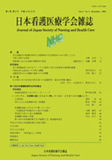Japanese
English
- 有料閲覧
- Abstract 文献概要
- 参考文献 Reference
- サイト内被引用 Cited by
要旨
本研究の目的は、在宅高齢者の配偶死別者と有配偶者の生活要因からみた閉じこもり現象の実態と、この現象に影響を及ぼす生活要因について検討し、閉じこもり予防対策を考える基礎資料とすることである。日常生活自立度Jランクの在宅高齢者321名(死別者189名、有配偶者132名)を対象に、質問紙を用いた訪問面接調査を実施した。各対象について、閉じこもりと閉じこもりハイリスクをrisk群、非閉じこもりをnon-risk群に分類し、分析を行った。その結果、以下のことが明らかになった。
1.閉じこもりの出現率は、死別者群1.6%、有配偶者群1.5%であり、両群による閉じこもりの頻度に差はみられなかった。
2.死別者群では39.7%、有配偶者群では43.9%の者がrisk群(「閉じこもり」「閉じこもりハイリスク」高齢者)であった。
3.死別者群、有配偶者群ともにrisk群には、高年齢、社会活動が不活発、活動意欲が低い、生活機能が低い、主観的健康感が悪い、社会的交流が乏しい、閉じこもりの自己認識がある、という特性が認められた。
以上より、「閉じこもり」「閉じこもりハイリスク」高齢者は「非閉じこもり」高齢者に比べ、身体・心理・社会的側面の機能が劣っていた。したがって、配偶者の有無というより「閉じこもり」「閉じこもりハイリスク」高齢者における身体・心理・社会的側面の機能低下に注目した予防的ケアの必要性が示唆された。
Abstract
For the prevention of homebound elderly people, we clarified the present status of homebound elderly people and evaluated the life-style associated with their homebound state. A home-visit interview survey was performed using a questionnaire from 321 home-living elderly people with J rank independence in daily life, of whom 189 had lost a spouse, but the other 132 had a spouse. Subjects who are homebound or at a high risk of being homebound states were classified as a risk group and non-homebound subjects as a non-risk group.
1. The incidence of homebound states was 1.6% in the bereaved subjects and 1.5% in the subjects with a spouse.
2. The risk group included 39.7% of the bereaved subjects and 43.9% of the subjects with a spouse.
3. In both the bereaved subjects and subjects with a spouse, the risk group was characterized by advanced age, decreased social activities, poor will to be active, low living function, poor feelings of good health, poor social association, and a self-awareness of their homebound state.
These results suggested poorer physical, psychological, and social functions in the risk group than in the non-risk group and the necessity for the prevention of homebound states in the risk group.
Copyright © 2002, Japan Society of Nursing and Health Care All rights reserved.


